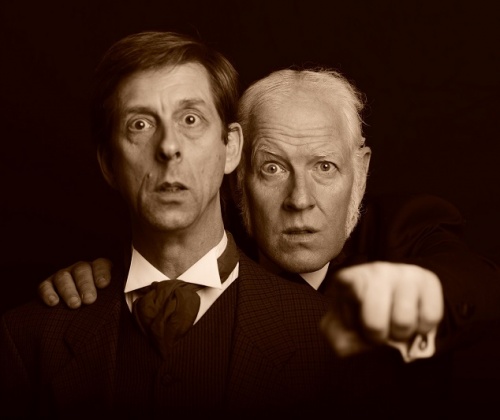THE WOMAN IN BLACK
Isaac Theatre Royal, The Gloucester Room, Christchurch
29/03/2018 - 01/04/2018
Production Details
Famous Gothic play will haunt the Isaac Theatre Royal these Easter holidays
Following the success of their previous Gothic-themed shows, NO Productions Theatre Company returns to the Gloucester Room at the Isaac Theatre Royal to present another ghostly tale: The Woman in Black, from 29 March to 1 April.
This ghost story masterpiece by Stephen Mallatratt and Susan Hill has been one of the biggest – and scariest – theatre hits over the past 30 years. It tells the story of Mr. Kipps, a solicitor who visits a mysterious house in the eerie marshes to settle the affairs of a recently deceased old woman – and discovers all too late why the townsfolk avoid the place…
Produced and directed by Ukrainian-born theatre maker Nataliya Oryshchuk, the production features the skilful and versatile Christchurch actors David Allen and Michael Adams, with an original set designed by Julian Southgate.
Isaac Theatre Royal, the Gloucester Room
29 March – 1 April, 7.30 pm
31 March Matinee 2pm
Tickets available at Ticketek, book here
Theatre ,
A brilliantly enacted dynamic
Review by Lindsay Clark 01st Apr 2018
As a novel (published 1983), as well as in subsequent stage and film adaptations, this consistently popular Gothic tale attests once again to the insatiable lure of a good haunting. Here, in The Woman in Black, it is the outcome of unquenchable revenge and bitterness, revealed through a series of tantalising glimpses before a final twist magnifies the horror and the impact beyond that of a cleverly spooky tale into the shadowy territory of illusion, even self-delusion, even coincidence, if your mind can bend that way.
This company, No Productions, has proved its imaginative enterprise before in the chamber setting of The Gloucester Room (most recently The Turn of the Screw). The challenge for two actors and an apparition presents even more demanding material in the current production. Here, we have the ghost in question appearing multiple times, as well as a complex though beautifully handled narrative structure, which uncovers the terror and mystery in short clips, albeit with the frequent reassurance that this time we’ll go to the end.
The initial situation prods our curiosity gently enough, as one white haired (prematurely aged?) Arthur Kipps (Michael Adams), desperate to tell the story which has cost him his happiness and reason, consults with an actor (David Allen) about how to present the tale clearly to “those who need to know”. We are in an empty Victorian theatre and the coaching set up provides an entertaining focus, though each participant is firmly fixed on a serious approach.
Kipps’ five hours’ worth of words in the careful document he is carrying, are to be crunched into appropriate theatre by engaging the imagination of the audience and in a further daring move, by having the actor present the Kipps role and Kipps himself provide all others. The play within a play offers layers of illusion which ensure a richly layered experience for us.
Illusion is at first dispelled simply by saying so openly, and using multiple roles, symbolic furnishing and so forth, so that a strongly convincing perspective on even supernatural goings on becomes credible. Recorded sound, a new invention at the time this Gothic tale is set, further confirms the pony and trap world we are all stepping into.
Kipps, as a conscientious junior solicitor, is sent to sort through the papers of a deceased client, aged reclusive, Alice Drablow. Her house is out on the marshes, accessible only by causeway and at low tide, but the real reason that locals avoid it, we soon discover, is that it is undeniably haunted. There is no shortage of instances as the spectre of a wasted woman is seen again and again, as well as some chilling moments in the mist of the marsh itself.
Both roles are huge. Kipps has to become a host of locals encountered in the development of the horror and Michael Adams shows his range and versatility with accomplished ease, as well as establishing the hapless solicitor who starts things off.
As The Actor, whose trade is in imagination, but who finds himself treading the path of reason as long as he can, David Allen is similarly fine. With his lean and expressive presence, he seems custom-made for the Gothic realm. It is the revelation of his final position that clinches the carefully mounting horror of the piece. Between them, the pair presents a riveting experience within a fascinating story.
Production support is a little variable for me. Julian Southgate’s set meets all the range of location and situation neatly and Michael Adams’ sound design is mercifully free of the heavy handed underscoring of dramatic events, which seems to align with the sensory overload of some contemporary theatre making. The critical presentation of the Woman herself though is less assured, partly because all is so unhelpfully intimate in this venue, but partly through the choice to represent two further and simultaneous manifestations of her behind the rear gauze, confusing and weakening her overall effectiveness for me.
The considerable strength of the play lies in a brilliantly enacted dynamic between the tellers and the tales as well as a genuine chill when we are forced to consider the ‘what if’ of the concrete existence we take for granted.
Copyright © in the review belongs to the reviewer





Comments